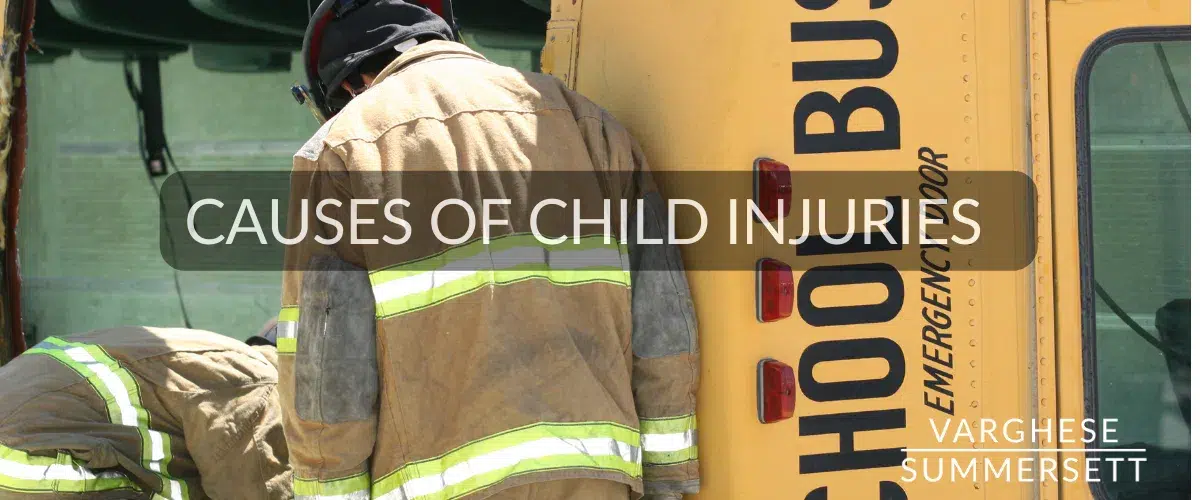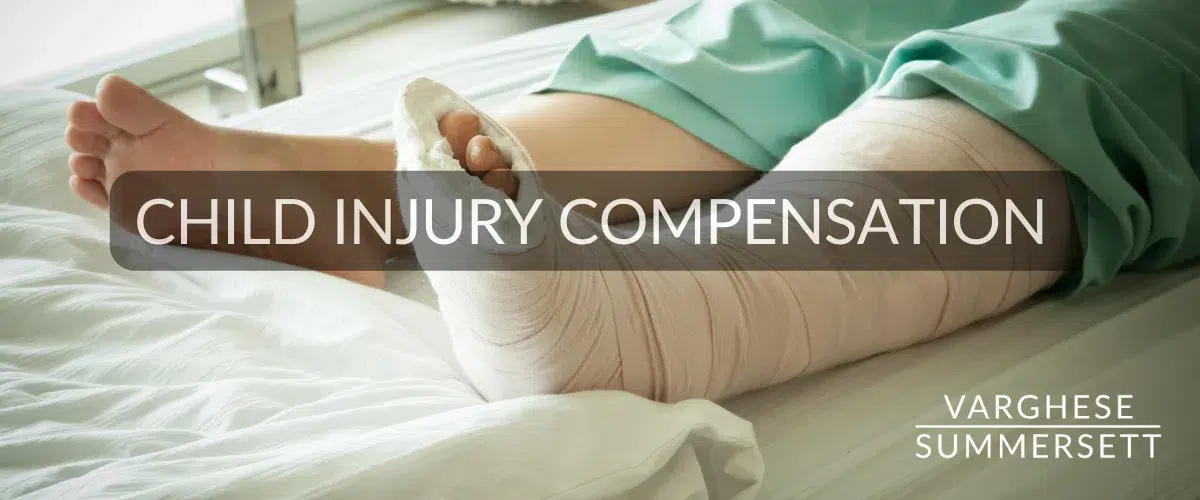Fort Worth Child Injury Lawyer | Do This if Your Child is Injured
As a parent, we do everything in our power to protect our children. We hope and pray that nothing serious or traumatic ever happens to them. But life is unpredictable and accidents and injuries can and do happen – often due to someone else’s negligence, recklessness, or even criminal behavior.
When the unthinkable or unexpected happens to your child, it’s only natural to want to hold the responsible party accountable. That’s where a Fort Worth child injury lawyer comes in. At Varghese Summersett Injury Law Group, we understand that there is nothing more precious or important in your life than your child.
Our team will fight to ensure that your child receives the justice and compensation they deserve. Whether they were injured in a vehicle accident, school setting, or in a public place, we have the experience and expertise to handle even the most complex and heart-wrenching child injury cases.
In this article, our Fort Worth child injury lawyer explains negligent child injuries, the process for recovering compensation, and how our law firm can help. Importantly, the personal injury attorneys at Varghese Summersett work on contingency, which means you will never pay us anything upfront or out-of-pocket. We are only paid if, and when, we get compensation for you.
We know you and your child are going through a difficult time and we will never add to your financial or emotional distress.

Common Types of Negligent Child Injuries
Personal injury cases involving minors often stem from the negligence, recklessness, or misconduct of another party or entity. Examples of such cases include:
Playground Injuries
Playground injuries are a common type of negligent child injury, often resulting from poorly maintained equipment, inadequate supervision, or unsafe surfaces. Injuries can range from minor cuts and bruises to more severe fractures, dislocations, and head injuries. Ensuring that play areas are properly maintained, age-appropriate, and supervised can help reduce the risk of playground injuries.
School-Related Injuries
Schools have a duty to provide a safe environment for children. Negligent school-related injuries can occur due to inadequate supervision, lack of safety measures, or hazardous conditions on the school premises. These may include slips and falls, sports injuries, or accidents during field trips. It is essential for schools to follow safety protocols and maintain a vigilant staff to minimize such incidents. These incidents may involve broken bones, head injuries, or emotional trauma.
Car or Bus Accidents
Children can suffer injuries in car accidents due to negligence, such as improper use of child safety seats, reckless driving, or driving under the influence of alcohol or drugs. Injuries can range from minor to life-threatening, depending on the severity of the accident. Ensuring proper use of safety restraints, obeying traffic rules, and practicing safe driving habits can help prevent car accident-related child injuries.
Dog Bites or Animal Attacks
Dog bites and animal attacks can lead to severe injuries, including puncture wounds, infections, and even psychological trauma. These incidents may result from negligent pet owners who fail to properly restrain or control their animals. It is crucial for pet owners to be responsible, ensuring their pets are socialized, supervised, and securely contained to minimize the risk of animal-related child injuries.
Defective Products or Toys
Children can be injured by defective products or toys, which may have manufacturing or design flaws, inadequate safety warnings, or be made of harmful materials. Parents should carefully research and select age-appropriate toys, as well as regularly inspect them for damage. Manufacturers and retailers have a responsibility to ensure their products meet safety standards and promptly address any potential hazards.
Daycare Accidents
Daycare accidents can occur due to negligent supervision, unsafe facilities, or inappropriate activities. Common injuries include falls, cuts, or choking hazards. It is essential for daycare providers to maintain proper safety measures, provide age-appropriate activities, and ensure that staff are well-trained and attentive to reduce the risk of accident
Swimming Pool Accidents
Swimming pool accidents can result from inadequate supervision, improper fencing or barriers, or lack of safety equipment. These accidents can lead to drowning, near-drowning, or other water-related injuries. Parents, pool owners, and caregivers must ensure that children are closely supervised around water, safety equipment is readily available, and pool areas are properly secured to prevent unauthorized access.
What to Do if Your Child Has Been Hurt Due to Negligence
If your child has been injured in a negligent or reckless accident, it’s imperative to follow these steps to increase your chances of a successful injury claim:
- Seek immediate medical attention: Your child’s health and well-being are the top priority. Seek medical care as soon as possible to assess and treat their injuries.
- Document the incident: Take photographs of the accident scene, your child’s injuries, and any property damage. Collect contact information from witnesses and, if applicable, obtain a copy of the incident report from the police or other authorities.
- Preserve evidence: Keep any evidence related to the accident, such as defective toys, torn clothing, or damaged equipment. This evidence may be crucial in proving negligence or recklessness.
- Consult a Fort Worth child injury lawyer: Contact an experienced child injury lawyer at Varghese Summersett to discuss your case. They will guide you through the legal process, helping you understand your rights and how to seek compensation for medical bills, pain and suffering, and other damages.
- Avoid discussing the case: Do not discuss the details of the accident or your child’s injuries with anyone, including insurance companies, without first consulting your attorney. Anything you say could potentially be used against you in the legal process.
- Follow your attorney’s advice: Your lawyer will have experience handling similar cases and will provide guidance on the best course of action. Follow their recommendations to improve your chances of a successful outcome.
By following these steps, you can protect your child’s rights and work towards obtaining the compensation they deserve after a negligent or reckless accident.
How a Fort Worth Child Injury Lawyer Can Help
A Fort Worth child injury lawyer can provide invaluable assistance if your child has been injured due to someone else’s negligence or recklessness. Here are some ways a child injury lawyer can help:
- Case evaluation: An experienced Fort Worth child injury attorney will assess the facts of your case, determine potential liability, and advise you on the best course of legal action to pursue. At Varghese Summersett Injury Law Group, we offer free consultations, so there is no reason not to call for a complimentary case evaluation.
- Investigation: A lawyer will conduct a thorough investigation into the circumstances surrounding the injury, gathering evidence such as medical records, witness statements, and expert opinions to identify all responsible parties and build a strong case on your child’s behalf.
- Legal representation: Your attorney will advocate for your child’s best interests, negotiating with insurance companies and other parties involved, and representing you and your child in court if necessary.
- Calculating damages: A skilled Fort Worth child lawyer will determine the full extent of your child’s economic and non-economic damages, ensuring that you and your child seek the appropriate compensation to cover medical expenses, lost wages, pain and suffering, and other related costs.
- Navigating complex legal processes: Child injury cases can involve complex legal procedures and regulations, such as statutes of limitations and comparative negligence laws. A knowledgeable attorney will guide you through these complexities and help you avoid potential pitfalls.
- Emotional support: An experienced Fort Worth child injury lawyer will understand the emotional toll that an injury can take on your child and your family. They can provide compassionate support throughout the legal process and help alleviate some of the stress associated with pursuing compensation.
By enlisting the help of a Fort Worth child injury lawyer, you can focus on your child’s well-being and recovery while they handle the legal aspects of your case.

Types of Compensation in Texas Child Injury Cases
Our Fort Worth child injury lawyers understand that no amount of money can make up for the physical and emotional trauma your family has endured, but it can help cover medical expenses, lost wages from the parents’ time off work, and other costs associated with your child’s injury. In Texas, compensation can be awarded for various types of damages. These damages are typically divided into three categories: economic, non-economic, and punitive.
Economic Damages
Economic damages are the quantifiable financial losses resulting from the injury. They can include:
- Medical expenses: These cover the costs of hospitalization, surgery, medications, physical therapy, and any ongoing or future medical care required due to the injury.
- Lost wages: If the parent or guardian had to take time off work to care for the injured child, they may be eligible to receive compensation for their lost income.
- Future earning capacity: If the child’s injuries are severe enough to impact their ability to work in the future, compensation may be awarded to account for their reduced earning potential.
Non-Economic Damages
Non-economic damages address the intangible losses that the child and their family experience due to the injury. These can include:
- Pain and suffering: Compensation for the physical and emotional pain that the child endures as a result of the injury.
- Emotional distress: This covers the emotional trauma and psychological effects the accident may have had on the child and their family.
- Loss of enjoyment of life: If the child’s injuries limit their ability to participate in activities they once enjoyed, they may be compensated for this loss.
- Loss of consortium: This refers to the negative impact the child’s injuries have had on the family unit and relationships.
Punitive Damages
Punitive damages are not awarded in every case and are intended to punish the at-fault party for particularly reckless or malicious behavior. They serve as a deterrent to others and emphasize the severity of negligent actions.
It is important to consult with a Fort Worth child injury lawyer to evaluate the specific details of your case and determine the potential damages that could be sought on behalf of your child.
How To Prove Negligence in a Child Injury Case
Proving negligence in a child injury case involves four key elements:
- Duty of care: You must demonstrate that the defendant (the person or entity you are suing) owed a duty of care to your child. This means that the defendant had a legal responsibility to act in a reasonable and cautious manner to avoid causing harm to your child.
- Breach of duty: You need to show that the defendant breached their duty of care by failing to act reasonably in the given situation. This can be demonstrated through evidence, such as witness testimony, photos, or video footage, that shows the defendant’s actions (or inactions) were careless, reckless, or negligent.
- Causation: It is crucial to prove that the defendant’s breach of duty directly caused your child’s injury. This involves establishing a clear link between the defendant’s actions and the harm that occurred. Medical records, expert opinions, and other documentation can be used to show that the defendant’s negligence led to the injury.
- Damages: Finally, you must prove that your child suffered damages as a result of the defendant’s negligence. Damages can include medical expenses, pain and suffering, emotional distress, and other losses related to the injury. You will need to provide evidence, such as medical bills or expert testimony, to support your claim for damages.
A Fort Worth child injury lawyer will help gather the necessary evidence and build a strong case to prove negligence in a child injury case. Their expertise and knowledge of the the legal process will increase your chances of obtaining compensation on behalf of your child.
The Importance of Hiring a Specialized Fort Worth Child Injury Lawyer
Child injury cases can be complex and emotionally draining. At our law firm, we specialize in handling child injury cases, with a deep understanding of Texas laws, procedures, and the unique challenges involved. It’s crucial to have a Fort Worth child injury lawyer with specific expertise in this area for several reasons:
- Different legal standards: Children are held to different legal standards than adults, and a specialized lawyer will understand the nuances.
- Specific damages: Damages in child injury cases often involve future medical expenses, therapy, and educational needs.
- Strong Negotiation and Litigation Skills: Experienced child injury attorneys have a proven track record in negotiating settlements with insurance companies and other responsible parties. This experience translates to a higher chance of obtaining a fair and just settlement for your child. In some cases, a trial may be necessary. A seasoned Fort Worth child injury lawyer possesses the courtroom experience and skill set required to effectively present your case and secure a favorable verdict.
- Emotional support: A skilled Fort Worth child injury lawyer will be compassionate and empathetic, providing emotional support to the family during the legal process.
Why Choose Varghese Summersett as Your Fort Worth Child Injury Lawyer
The attorneys at our law firm are dedicated to helping families get through difficult times. We have the knowledge and experience required to build strong legal cases on behalf of children who have been injured due to someone else’s negligence. When you entrust us with your child’s injury case, you can expect:
- Personalized attention: We treat each case with the utmost care and compassion, tailoring our approach to your family’s unique needs.
- Extensive experience: Our lawyers have years of experience handling complex child injury cases, with a proven track record of success.
- Aggressive representation: We fight aggressively for maximum compensation, ensuring that every responsible party is held accountable.
- Accessible: Our team pride itself on being accessible to our clients. We know you are going through a difficult time and we return calls and correspondence as quickly as possible so that you always have accurate and timely information about your case.
- No-win, no-fee: We operate on a contingency fee basis, meaning you don’t pay unless we win your case – either through a settlement or trial. You will never receive a bill from us. If we don’t win, we don’t get paid.
Our lawyers understand the complex legal issues that can arise in child injury cases, such as determining fault and liability, negotiating with insurance companies, and filing claims on behalf of minors. We are also parents, too. If you have questions or would like to discuss your case in more detail, we are available by phone anytime at (817) 207-4878.
Speak to a Fort Worth Child Injury Lawyer Today.
Navigating the legal process after a child’s injury can be challenging and emotionally draining. By choosing a dedicated and experienced Fort Worth child injury lawyer, you can focus on your child’s recovery while we fight for the justice and compensation they deserve.
With our personalized approach, extensive experience, and aggressive representation, you can trust us to be your family’s advocate during this difficult time. We will leave no stone unturned in our effort to identify each and every person and entity responsible for your child’s injuries or wrongful death. We will then fight to hold them accountable.
Call 817-207-4878 (HURT) today for a free consultation with an experienced Fort Worth child injury lawyer. If we take your case, you will never pay anything upfront or out-of-pocket. We only get paid if we win compensation for you.

FAQS About Fort Worth Child Injury Cases
How long do I have to file a child injury lawsuit in Texas?
In Texas, the statute of limitations for personal injury cases is generally two years from the date of the injury. However, for child injury cases, the clock does not begin until the child’s 18th birthday, giving them until their 20th birthday to file a claim. It’s essential to consult with an experienced child injury lawyer to understand the specific deadlines for your case.
If my child missed school due to an injury, can they receive compensation for tutoring or special education?
Yes, if your child missed school due to an injury caused by someone else’s negligence or recklessness, you may be able to seek compensation for the costs associated with tutoring or special education. This falls under the category of economic damages, which cover the financial losses that result from the injury.
In order to receive compensation for tutoring or special education, you will need to demonstrate the following:
- The injury directly caused your child to miss school or impacted their ability to learn effectively.
- The tutoring or special education services were necessary for your child to catch up academically or address any learning difficulties caused by the injury.
- You incurred expenses related to these services as a direct result of the injury.
Working with a Fort Worth child injury lawyer can help you gather the necessary documentation and build a strong case for compensation. They will guide you through the legal process and ensure that you seek the appropriate damages to support your child’s educational needs following an injury.
Is a child injury claim filed in a parent or child’s name in Texas?
In Texas, a child injury claim is typically filed by the parent or legal guardian on behalf of the injured child. The parent or guardian acts as the child’s “next friend” or legal representative throughout the legal proceedings. This is because a child under the age of 18 is considered a minor and cannot initiate a lawsuit on their own.
When the claim is settled or a verdict is reached, the compensation awarded for the child’s injuries is typically placed in a trust or other financial arrangement to ensure that the funds are used for the child’s benefit. In some cases, a court may require that the settlement funds be deposited into a court-approved account or a structured settlement annuity until the child reaches the age of majority.
It’s essential to work with an experienced Fort Worth child injury lawyer to navigate the legal process and ensure that the child’s best interests are protected throughout the claim.
What if I can’t afford a Fort Worth child injury lawyer?
While we can’t speak for other law firms, we can say, unequivocally, that you can afford a Fort Worth child injury lawyer at Varghese Summersett. We work on contingency, which means we don’t get paid unless, and until, you get paid. Our fees come out of the settlement or award if we are successful. If we don’t win, we don’t get paid. It’s that simple. We also offer free case evaluations, so you will never pay anything upfront or out-of-pocket.
Can someone still be held liable for my child’s injury if we signed a waiver?
Even if you signed a waiver, it may still be possible to hold someone liable for your child’s injury, depending on the circumstances of the case. Waivers, also known as liability release forms, are designed to protect businesses and organizations from legal liability in case of accidents or injuries. However, they are not always enforceable, and there are situations where you can still pursue a claim.
Some reasons a waiver may not be enforceable include:
- Gross negligence or willful misconduct: If the party responsible for your child’s injury acted with gross negligence or willful misconduct, a waiver may not protect them from liability. Gross negligence involves a high degree of carelessness, while willful misconduct implies a deliberate disregard for the safety of others.
- Ambiguity or unclear language: If the waiver’s language is ambiguous or unclear, it may not be enforceable. A waiver should clearly outline the risks involved and the rights being waived by the signatory.
- Violation of public policy: Some waivers may be considered void and unenforceable if they violate public policy, such as attempting to waive liability for intentional acts or requiring a waiver for essential services.
- Inadequate supervision or failure to follow safety regulations: If the responsible party failed to provide adequate supervision or follow safety regulations, the waiver may not protect them from liability for your child’s injury.
It’s essential to consult with an experienced Fort Worth child injury lawyer to determine if a waiver may impact your ability to seek compensation for your child’s injury. They can help you review the waiver, investigate the circumstances of the case, and identify the best course of action to pursue a claim.
Can we seek compensation for emotional distress caused my child’s injury?
Yes, you can seek compensation for the emotional distress caused by your child’s injury in Texas. Emotional distress is considered a non-economic damage, which covers the intangible losses that your child and your family have suffered as a result of the injury. When pursuing compensation for emotional distress, you will need to demonstrate the following:
- The injury directly caused your child or your family to experience significant emotional pain and suffering, such as anxiety, depression, or post-traumatic stress disorder (PTSD).
- The emotional distress is directly related to the defendant’s negligent or reckless actions that caused the injury.
- The emotional distress has had a substantial and lasting impact on your child’s and/or your family’s well-being and quality of life.
It is important to note that proving emotional distress can be challenging, as it often relies on subjective evidence. Working with a Fort Worth child injury lawyer can help you gather the necessary documentation, such as medical records, psychological evaluations, and expert opinions, to build a strong case for emotional distress compensation.
An experienced attorney will also be familiar with the specific requirements and limitations that apply to emotional distress claims in Texas, ensuring that your claim is appropriately structured and presented for the best possible outcome.
How common are child injuries?
Child injuries are unfortunately quite common. According to the Centers for Disease Control and Prevention (CDC), injuries are the leading cause of death for children and teenagers in the United States. Every year, thousands of children die, and millions more are treated in emergency departments for nonfatal injuries.
Some common causes of child injuries include:
- Motor vehicle accidents: Car accidents are a leading cause of injury and death for children, with many accidents resulting from driver error, negligence, or vehicle defects.
- Falls: Falls are the most common cause of nonfatal injuries among children, often occurring at home, playgrounds, or other recreational areas.
- TDrowning: Drowning is a significant cause of death for children, especially among those aged 1 to 4 years. It can occur in swimming pools, bathtubs, or natural bodies of water.
- Burns: Children are at risk of burn injuries from various sources, including hot liquids, open flames, and electrical sources.
- Sports and recreational activities: Injuries can occur during organized sports, playground activities, or other recreational pursuits.
- Poisoning: Accidental poisoning from medications, household chemicals, and other substances is another common cause of child injury.
- Choking and suffocation: Young children, especially infants, are at risk of choking on small objects, suffocating in unsafe sleeping environments, or getting entangled in cords and strings.
It’s crucial to take preventive measures to protect children from injuries, such as using appropriate safety equipment, closely supervising children, and following safety guidelines. If your child has been injured due to someone else’s negligence or recklessness, consult with a Fort Worth child injury lawyer to learn about your legal options for seeking compensation.
Do children have to testify in personal injury cases?
Although most Texas child injury cases settle before trial, child plaintiffs often have to testify in personal injury cases if the case does go to trial. The decision to have a child testify will depend on various factors, such as the age of the child, the nature of the injury, and the specific details of the case.
Generally, children who are old enough to understand the nature of the legal process and the importance of telling the truth may be called upon to testify in court. However, there are special considerations that must be taken into account when questioning a child, such as ensuring that the child feels safe and comfortable, and that the questions are age-appropriate.
In many cases, alternative methods of obtaining evidence may be used instead of having a child testify in court. For example, a child’s statement may be recorded in a safe and supportive environment, and played back in court as evidence.
Ultimately, the decision to have a child testify in a personal injury case will depend on the specific circumstances of the case and the judgment of the legal professionals involved.





